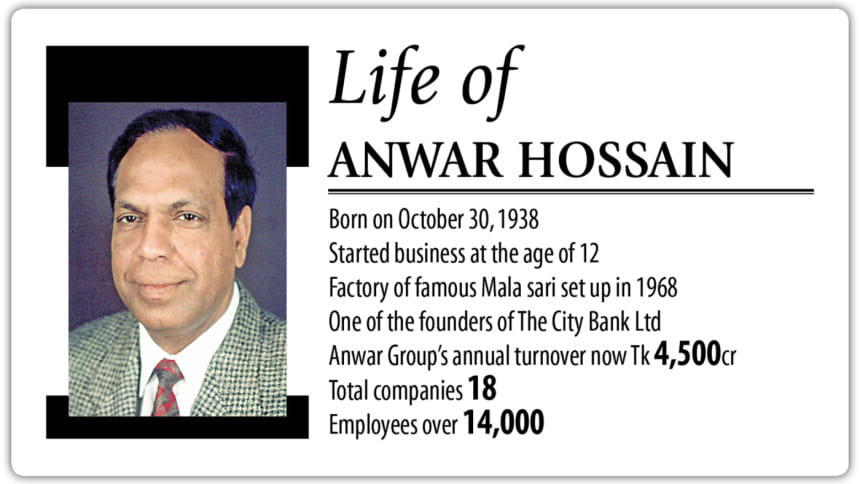Anwar Hossain departs but his fame lives on

After the partition of India and Pakistan in 1947, then East Pakistan was not an ideal place for local entrepreneurs to do business as non-Bangalees from West Pakistan were in complete control.
The situation started to change after some businessmen began their entrepreneurial journey, especially from Dhaka and Narayanganj. Narayanganj was the business hub in East Pakistan, now Bangladesh.
Anwar Hossain, a businessman from old Dhaka, was one of them.
Born in 1938 in a family with a legacy of business in Lalbagh, Hossain lost his father at the age of six. He began his journey when he was 12.
His mother gave him a small amount of money as the primary capital of the business. He started cloth trading.
"By converting some silver coins given by my mother, I started afresh in the name of Anwar Cloth Store," said Hossain in an interview published in the Commercial History of Dhaka by the Dhaka Chamber of Commerce and Industry (DCCI) in 2008.
His focus was on creating as many jobs as possible. So, he targeted investing in heavy industries. In 1956, he set up Sunshine Cable and Rubber Industry, the first Bengali-controlled industry in Pakistan. Later he quit the business leaving it in the hands of his uncle and brothers.
In 1966, he set up a factory, Anwar Silk Mills, in Tongi to make banarasi saris.
He produced "Mala Sari" which was an instant hit. Since then, he never looked back. Mala sari created such a buzz in the markets that almost all women in the country used to wear it.
There was a time when wedding ceremonies would not be completed had not the Mala sari been given to the brides.
"People started calling him as Anwar of Mala sari to differentiate from other Anwars," said Mahbubur Rahman, president of the International Chamber of Commerce – Bangladesh and a long-time friend of Hossain.
He crossed many hurdles to be a successful entrepreneur and to establish Anwar Group of Industries, employing 1,4000 people.
"I always wanted to create jobs for my countrymen. I am not happy with 14,000 workers. I want to make it 25,000," he told The Daily Star in an interview in 2012.
The conglomerate, whose trace dates back to 1834, has 18 concerns. The entities produce 36 products and services in areas ranging from textiles, jute, cement, steel, banking, insurance to automobiles, housing and furniture.
Hossain breathed his last on August 17 while undergoing treatment at Labaid Hospital in Dhaka. He was 83.
Trade bodies and associations expressed deep shock at his demise.
Hossain bought a weaving factory in Ruhitpur. By 1960, he took office in Karachi, Pakistan, to expand the business. Gradually, he became known as a businessman in Karachi, Lahore and Layalpur.
He was one of the pioneers in the cutlery business in Bangladesh when he established Manwar Cutleries.
An innovative Hossain was an inspiration for many entrepreneurs in different sectors as he played a pioneering role in setting up in Independent Bangladesh.
"Anwar Hossain was a self-made businessman although he had a family business in textile since a lot earlier," said ICCB's Rahman.
Rahman first met him when Hossain and some other businessmen were lobbying with the government to give more opportunities to the private sector in the late 1970s.
They were able to convince the government in 1978 that the country needed private banks. Hossain later set up The City Bank Ltd and City Insurance Ltd.
Hossain was director of the DCCI for several tenures, but he did not want to be the president of the platform.
"Anwar could have been the DCCI president for many tenures had he wanted it," Rahman said.
Hossain was elected a lawmaker from Dhaka-8 constituency from the Jatiya Party in the fourth parliamentary elections of 1988.
He also contributed to the introduction of the mobile phone in the country. He was able to convince military dictator HM Ershad about the advantage of mobile phones. Now the whole country is under the coverage of the mobile network.
Hossain could not pursue higher education as he was busy creating new industries and expanding them. However, his three sons are highly educated.
As he grew older, he began to bring in successors to the business and gave them management responsibilities.
One of his sons, Manwar Hossain, leads the group as the group managing director, while Hossain Mehmood runs the textiles division as the managing director, and Hossain Khaled looks after the jute, automobiles and real estate divisions.
For the new generation, he suggested maintaining business ethics.
"That is the main key and the main capital as I watched it everywhere when travelling across the world," said Hossain in the Commercial History of Dhaka.
He did a good business and earned a lot of money until 1958 when General Ayub Khan declared martial law. Anwar made a declaration of his wealth and opened an income tax file.
He was only about 20 years old at that time, which raised eyebrows from many.
Recalling his legacy, Manwar Hossain said his father advised them to think about job creation first, not profit.
"My father gave importance to employees and took care of them. He believed that: If you take care of them, they will take care of you. Then businesses will be run smoothly," Manwar Hossain said.
Anwar Hossain won the Bangladesh Business Awards 2011, an initiative of The Daily Star and DHL Express, a global giant in logistics, for transforming a nearly 200-year-old family business into a business empire.


 For all latest news, follow The Daily Star's Google News channel.
For all latest news, follow The Daily Star's Google News channel. 



Comments